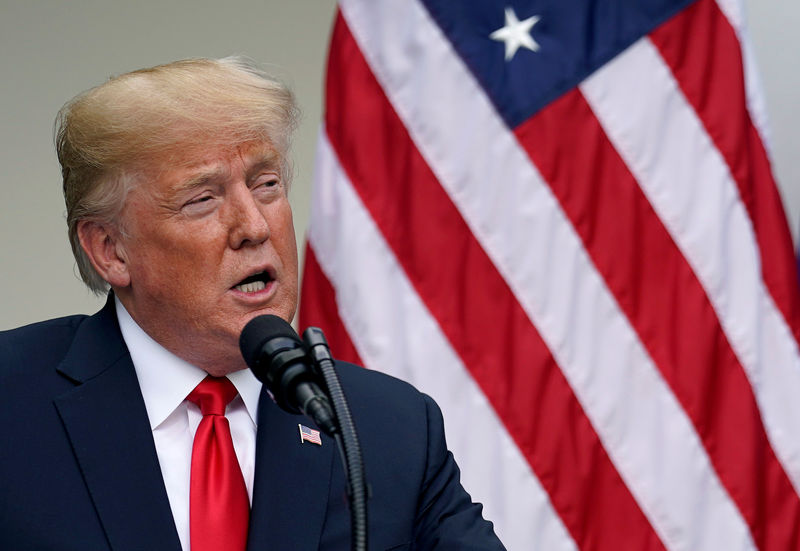By Madeline Chambers and Leigh Thomas
BERLIN/PARIS (Reuters) - Europe expressed relief on Thursday after U.S. President Donald Trump and the European Commission chief agreed to tackle their transatlantic trade row, although France cautioned that any deal must be limited and benefit both sides.
Reaction on financial markets ranged from enthusiasm on stock exchanges to scepticism among currency investors, while commodities experts said Trump's proclamation that Europe would buy "lots of" soybeans from U.S. farmers hit by his trade row with China was not all that it seemed.
After meeting European Commission President Jean-Claude Juncker at the White House on Wednesday, Trump agreed to refrain from imposing car tariffs while the European Union and the United States start talks on cutting other trade barriers.
Talks would seek to "resolve" U.S. tariffs on steel and aluminum and Europe's retaliatory duties, a step back from Trump's import protections for U.S. metal producers.
German Economy Minister Peter Altmaier, a conservative, hailed the talks as a "breakthrough" that could avoid a trade war and save millions of jobs. "Great for global economy," he tweeted late on Wednesday.
Business lobbies were relieved. "Reason has prevailed," BusinessEurope President Pierre Gattaz said.
However, Germany's DIHK chambers of Commerce noted that U.S. auto tariffs were not totally off the table. "The proposed solutions move in the right direction but a significant proportion of scepticism remains," the DIHK said.
European stocks rose on Thursday, with shares in carmakers Fiat (MI:FCHA), Porsche (DE:PSHG_p), Volkswagen (DE:VOWG_p) and BMW (DE:BMWG) all up by between 2 and 5 percent.
Reaction from Social Democrat members of the German coalition government was more measured. "This is not yet the result we are aiming for but it has made a positive result in the whole discussion ... on free trade or protectionism more likely than before," Foreign Minister Heiko Maas said in Seoul.
Referring to Trump's description of the European Union earlier this month as a "foe" on trade, he told a news conference: "America and Europe are not opponents ... We are partners and allies with common values and interests.
"The answer to America First can only be: Europe United," he added.
LARGELY SYMBOLIC
European Central Bank President Mario Draghi called the Washington meeting a good sign. "It shows that there is a willingness to discuss trade issues in a multilateral framework again," he said, but added: "It would be difficult for us to go beyond that because we really don't know the substance of it."
U.S. Treasury Secretary Steven Mnuchin said he expected a trade deal to come out in stages. He told CNBC that U.S. and European officials had "concluded an outline of an agreement" and planned to move forward to "turn it into a real agreement", but gave few details.
The response from France was also cautious. Finance Minister Bruno Le Maire welcomed the discussions with Washington but said he does not want to enter into a wide-ranging negotiation.
"Each side, the Europeans and the Americans, must find something in these discussions. Any trade deal must be based on reciprocity," he said in remarks distributed by his office.
With French framers forming a strong lobby, Le Maire added that agriculture must remain outside of any negotiation as Europe could not ease its food safety and environmental norms.
After the talks, Trump highlighted benefits for U.S. farmers. "The European Union is going to start, almost immediately, to buy a lot of soybeans," he told reporters.
However, market watchers said that Europe has already been a heavy buyer of U.S. soybeans since prices plunged in June as China has largely stopped buying them in retaliation for trade measures that Trump has targeted at Beijing.
Stefan Vogel, head of agricultural commodity markets research at Rabobank, described the statements from Washington as largely symbolic. "More purchases by the EU of U.S. soybeans will certainly take place in coming months but this would be for business reasons rather than the Trump/Juncker agreement," he said.
Currency markets were circumspect about the outcome of the Washington meeting as investors waited for the fine print.

"The one thing we have learned from the last 18 months of Trump’s gyrating trade policies is that whatever looks certain today is likely to be undermined tomorrow," Gavekal strategists said in a note.